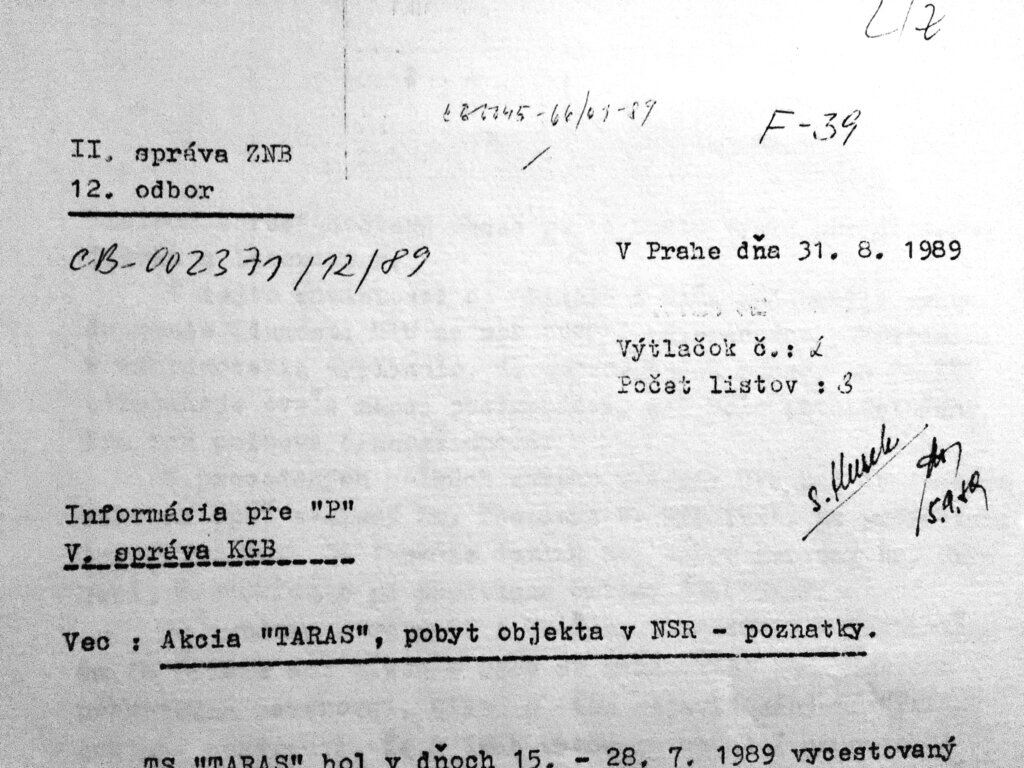In my previous article, I wrote about an agent named NIKOLAJ, who was sent to Munich on an intelligence mission against the Ukrainian Section of Radio Free Europe / Radio Liberty. Below we will look at two other agents TARAS and CERNY.
Case Study No. 2: Agent TARAS
August 1989 Report Excerpt
Subject: Operation “TARAS,” stay of the object in the FRG – Information

An excerpt from a secret report naming members of RL’s Ukrainian Service
Secret Collaborator TS “TARAS” visited the FRG between July 15 and 28, 1989. The place of his stay in the FRG was Munich. Radio Liberty editors picked them up at the train station. Private cars took them to the premises of the Free Ukrainian University, where “TARAS” was accommodated for the entire stay.
“TARAS” and another had the opportunity to evaluate the activities of the Free Ukrainian University in 1988. According to the evaluation, the number of participants in the summer courses is decreasing, which, in turn, has resulted in a general decline in the university’s activities.
During a discussion, “TARAS” learned that the Ukrainian section of RFE currently has no problems obtaining information from the USSR. The Ukrainian section of RFE receives several dozens of phone calls daily from the USSR, in which the callers provide all necessary information. They also benefit from the increasing number of visitors from the USSR.
As to the apparent lack of interest in this person among Ukrainian emigres, “TARAS” said that this situation was apparently caused by Peter G. (Grockého), who visited the FRG in May 1989 and who suspects that “TARAS” is a collaborator of the StB (State Security). “TARAS” is convinced that this is the result of operation “VEDA,” in which he testified against Peter G. (Grockého). Since then, their relationship has been burdened with permanent conflicts.
Case Study No. 3: Agent CERNY
Subject: The Ukrainian section of the radio station “Radio Liberty” in Munich, FRG – situation report
The editors of Radio Liberty receive their information from various sources, but recently the number of residents from the Ukraine who call and provide information has constantly been growing.
Secret collaborators “SERGEJ” and “CERNY” obtained information about the Ukrainian section of Radio Liberty during their stay in Munich in August 1989. One Radio Liberty editor is currently responsible for a program called “radio mailbox.” He reads letters- to-the-editors or parts of them to suit the Ukrainian program of Radio Liberty.
“CERNY” had the chance to briefly visit the “Radio Liberty” building. The two employees with him had to show their identification cards at the entrance. An American soldier opened the main gate, and they entered the yard by car. “CERNY” was not controlled at all. One employee accompanied “CERNY” to a studio where 11 to 13 employees worked. During his visit at RL, “CERNY” had the opportunity to spend several minutes in the security room where he and the soldier on duty watched all movements close to the RL building on a monitor.
During their talks, “CERNY” was offered cooperation by the Radio Liberty editor; he asked him to deliver contributions for the Ukrainian or Slovak sections by mail or telephone and provide tips for other activities. He was interested in contributions that could be used for RL programs, mainly: the emigration of the periods 1918-1948-1968; the life of the Ukrainians living in the West; and the Ukrainian question in the CSSR.
At the same time, he invited “CERNY” to come again in the following year (1990) but cautioned him not to mention that he was to visit the specific editor in any documents.
In the presence of “CERNY,” the Radio Liberty Editor had a telephone conversation with the brothers who were members of the Ukrainian Helsinki group in Lviv. He asked them about the results of their group’s meeting with the first secretary of the CPSU municipal committee in Lviv and commented on their remarks. The RL Editor claimed that currently, RL’s relations with Moscow were excellent, that they receive only verified and timely information from Moscow, and he, therefore, did not want to publish certain things without the participation of Moscow, to avoid a deterioration of their relations.
Because another Radio Liberty editor is a person of interest (zajmova osoba) in the OUN-matter, we ask our Soviet friends to send us reports on her activities in the USSR and an investigation of her sister, which would enable us to make all necessary preparations for their planned meeting in the CSSR.
If you have any demands concerning this matter, let us know.
For more information: See Chapter 8 in my book: Cold War Radio: The Dangerous History of American Broadcasting in Europe 1950-1989
